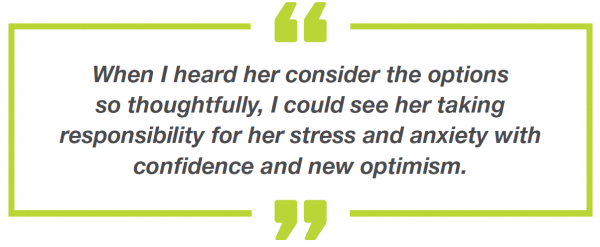What Stepped Care 2.0 Looks Like – A Parent Perspective
Parents have also expressed reactions to the new service model. While it would be easy to dismiss overly involved parent interests as intrusive, it is possible to harness that energy by joining forces in support of improved care. Calls from parents range from polite inquiries on treatment access to advocating aggressively for unrealistic and unnecessary service levels. If the stepped care service model rationale is well described, stakeholders, including parents, may respond positively. The following is a composite of conversations the Director at The George Washington University has had with several parents:
I had been on the phone night after night for hours, trying to calm my daughter down. She was going over and over how she felt anxious and unmotivated. When I told her to go to the counseling center she was reluctant, but went eventually on my insistence. So many things went through my mind about whether the process would be useful or not and I considered alternatives such as paying out of pocket for a community provider. I was shocked when she reported back that she had been presented with a choice of several options and could “step up” depending on her “specific need.” My initial thought was to call and complain, to demand that she be given a full course of psychotherapy, but when I heard her consider the options so thoughtfully, I could see her taking responsibility for her stress and anxiety with confidence and new optimism.

Of course, not all parents are as cooperative. Complaints range from: “why is a therapist telling my child to google it” to “this is not the service she was promised at orientation.” Stepped Care 2.0 is not meant to duplicate comprehensive specialist services available elsewhere in the health system. Instead it aims to provide more realistic expectations of campus mental health supports by shifting away from a consumer model to a philosophy of empowerment, autonomy and shared responsibility. This philosophy, of course, is at the heart of academic teaching, learning and scholarship missions of colleges and universities.

